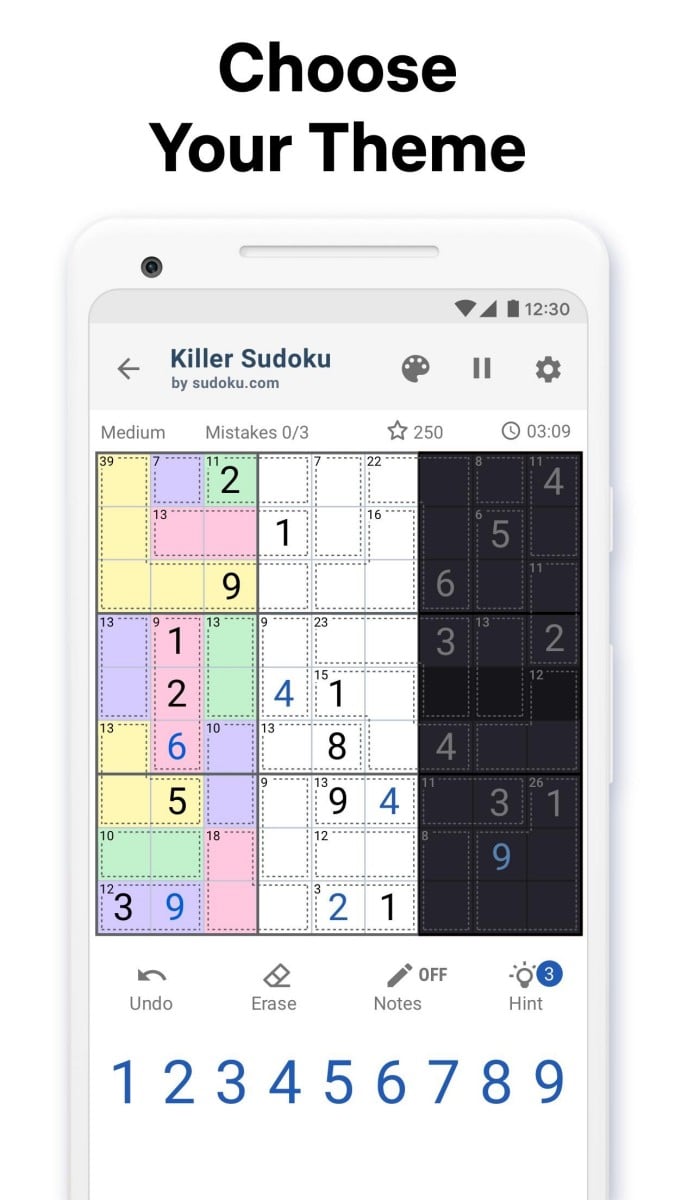
- Killer Sudoku by Sudoku.com
- Casual Games
-
- Platform:
- ios android
-
- Updated:
- Apr 11, 2025
-
- Version:
- 4.2.0
-
- Size:
- 190.6 MB
-
- Content Rating:
- 4+
-
- Developer:
- Easybrain
Get The Game
- Verified antivirus
- All download links on this website jump to official platforms such as App Store and Google Play. No viruses. No malware.
Description
Killer Sudoku by Sudoku.com is a logic and number puzzle game
developed by Easybrain that combines classic Sudoku and Kakuro
gameplay. Its core features and suitable groups are as
follows:
1. Game type: Advanced challenge of mathematical
logic puzzle solving
The game is based on the traditional
Sudoku framework, requiring players to fill in the numbers 1-9
in the 9×9 grid, ensuring that the numbers in each row, column
and 3×3 grid are not repeated. Its innovation lies in the
introduction of the "dotted cage" mechanism: the sum of the
numbers in each dashed cage must be equal to the value marked in
the upper left corner of the cage. For example, if a cage is
marked as "16", the number combination in the cage may be 7+9 or
8+8 (the latter is excluded due to repeated numbers), and
players need to determine the unique solution through logical
reasoning. This gameplay combines the uniqueness constraint of
Sudoku with the addition operation of the sum of numbers,
significantly improving the depth of strategy.
2. Game
Features: Multi-dimensional design enhances experience
Difficulty
grading system
Provides 5 difficulty modes from "fast",
"easy" to "expert", covering the needs of beginners to advanced
players. Low difficulty focuses on teaching basic rules, while
high difficulty tests players' advanced logical ability through
complex dotted box combinations (such as multi-grid
intersections, large sums of numbers).
Daily Challenge and
Achievement System
Puzzles are updated daily. Players can
get virtual rewards such as trophies after completing
challenges, which stimulates the motivation for continuous play.
The in-game statistics function records the best time to solve
problems and supports players' self-breakthrough.
Auxiliary
tools and humanized design
Automatic check: real-time
marking of repeated numbers to reduce errors.
Note
function: allows candidate numbers to be marked in the space to
assist reasoning.
Hints and undo: Get hints when stuck, and
erroneous operations can be undone unlimited times.
Cross-platform
adaptation: supports mobile phones and tablets, automatically
saves progress, and facilitates fragmented time play.
Visual
and interactive optimization
Provides a variety of color
themes, players can customize the interface style; long press
the lock number function to fill multiple squares at one time to
improve operation efficiency.
3. Suitable for all players
at all stages
Novice players: Quickly master the basic
rules of Sudoku through the low-difficulty mode, and gradually
develop logical ability by combining the dotted box addition
mechanism.
Advanced players: Complex dotted box
combinations in high-difficulty mode (such as cross-grids, large
sums) require the use of advanced techniques such as the "45
rule" (the sum of numbers in each row/column/grid is 45) to meet
the needs of deep puzzle solving.
Sudoku enthusiasts: The
variant gameplay of classic Sudoku provides freshness while
retaining the core fun of number uniqueness and avoiding
repetition.
Mathematics and logic trainers: The game
emphasizes addition operations and elimination reasoning, which
is suitable for exercising calculation ability and systematic
thinking.
Killer Sudoku by Sudoku.com Gameplay, skills and
precautions
1. Core gameplay: Fusion of Sudoku and number
sums
Basic rules
Fill in the numbers 1-9 in the 9×9
grid, ensuring that the numbers in each row, column and 3×3 grid
are not repeated, consistent with classic Sudoku.
Hitman
Features: Cage Mechanism
There are areas (Cages) divided by
dotted lines in the grid, and the sum value is marked in the
upper left corner of each Cage.
The player needs to use
logical reasoning to determine the combination of numbers in the
Cage so that the sum equals the marked value. For example, a
3-grid Cage marked with "10" could be 1+2+7 or 3+4+3 (the latter
is excluded due to repeated numbers).
2. Key Skills:
Problem-solving Strategies from Simple to Advanced
Prioritize
Cages with Decimal Values
2-grid Cage: The sum of 3 can
only be 1+2; the sum of 4 can only be 1+3.
3-grid Cage: The
sum of 6 can only be 1+2+3; the sum of 7 can only be 1+2+4.
Quickly
lock in a unique combination: For example, the sum of 16 (two
grids) = 7+9, and the sum of 17 (two grids) = 8+9 can be filled
in directly.
Cross-Exclusion Method
Combine the
restrictions of rows, columns, and palaces to eliminate
impossible numbers in the Cage. For example, if a certain palace
already has the number 5, then the Cage in that palace cannot
contain 5.
Extreme thinking of large-value Cage
Large
sum box (such as total 30): usually contains large numbers such
as 7, 8, 9, and try these combinations first.
Small sum box
(such as total 6): try the combination of 1, 2, and 3 first.
“45
rule”
The sum of numbers in each row, column, or 3×3 grid
is 45 (1+2+…+9).
Application scenario:
If the total of
the Cage in a row is known to be 17+16+7+3=43, then the
remaining space must be 45-43=2.
If the total of the Cage
in a palace is known to be 20, then the sum of the remaining two
grids is 45-20=25, which may be 9+8+8 (9+7+9 after excluding
duplication, which needs further verification).
White space
observation method
When you are stuck, fill in other areas
first, and it may be clearer when you look back. The clues of
Killer Sudoku are linked together, and sometimes "detours" can
lead to faster breakthroughs.
3. Notes: Avoid common
mistakes
Repeated numbers
Make sure that the numbers
in the Cage are not repeated, and do not repeat the numbers in
the row, column, or grid. For example, if you fill in 1+4 in a
2-grid Cage marked "5", you need to check whether there is
already a 1 or 4 in the row.
Ignore unique combinations
The
sum of some Cages corresponds to a unique number combination
(such as the sum of 4=1+3). You need to remember common
combinations to improve efficiency.
Over-reliance on
guessing
The core of Killer Sudoku is logical reasoning, so
avoid filling in numbers randomly. If you get stuck, use the
hint function in the game or undo the operation.
Ignore the
restrictions of rows, columns, and grids
Even if the number
combination in the Cage is correct, it may cause errors due to
violations of the uniqueness rules of rows, columns, and grids.
Cross-validation is required.
Online Games
-

- Stick Fight Combo
- Arcade Games
- 4.5
-

- Skibidi Hero iO
- Arcade Games
- 4.5
-

- Mini Golf Clash
- Sports Games
- 4.5
-

- Dunk Shot
- Casual Games
- 4.5
-

- Cut Dunk
- Casual Games
- 4.5
-

- Basketball Kings
- Casual Games
- 4.5
-

- Crazy BasketBall Machine
- Arcade Games
- 4.5
-

- Ninja Ranmaru
- Arcade Games
- 4.5














